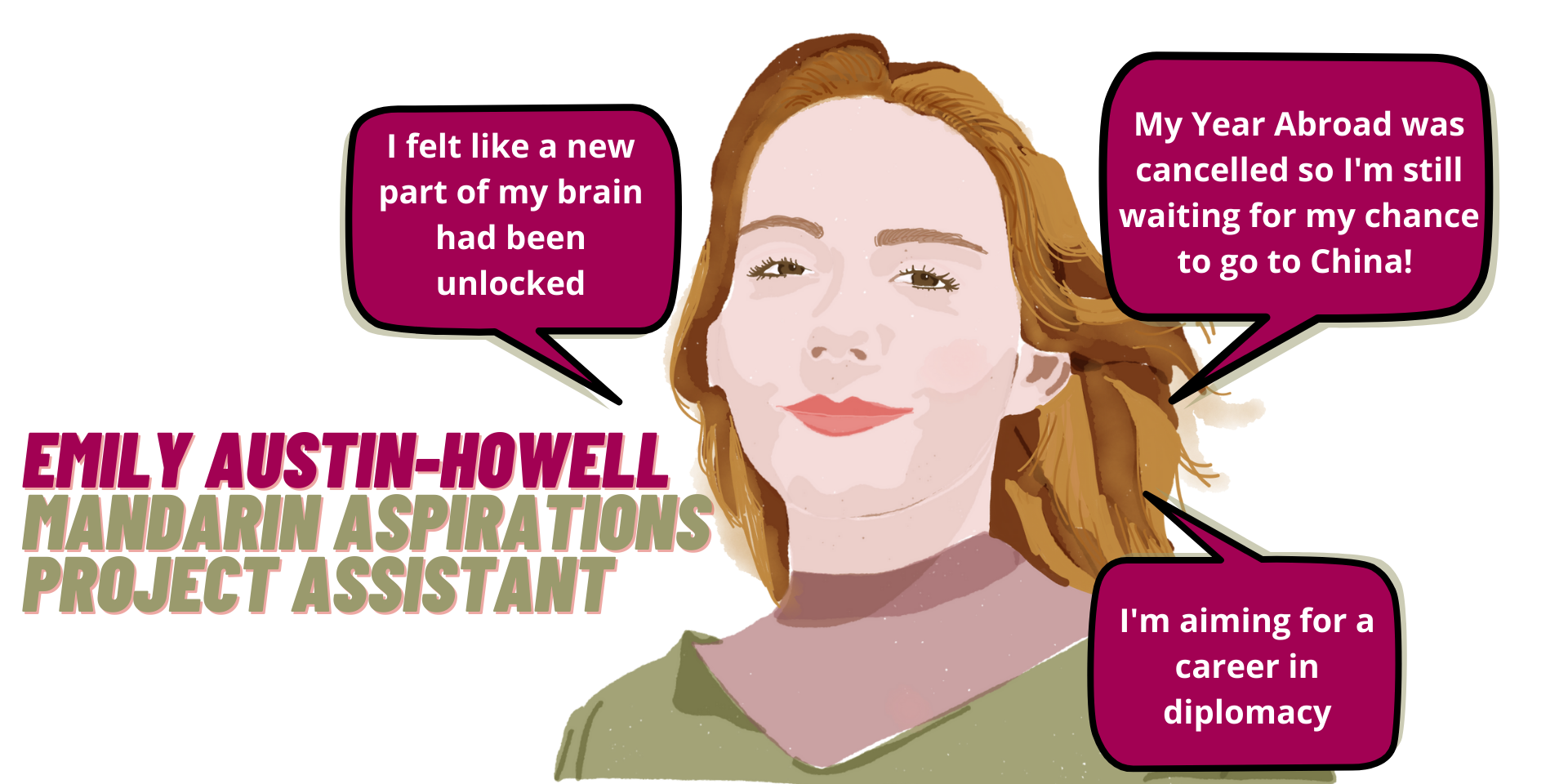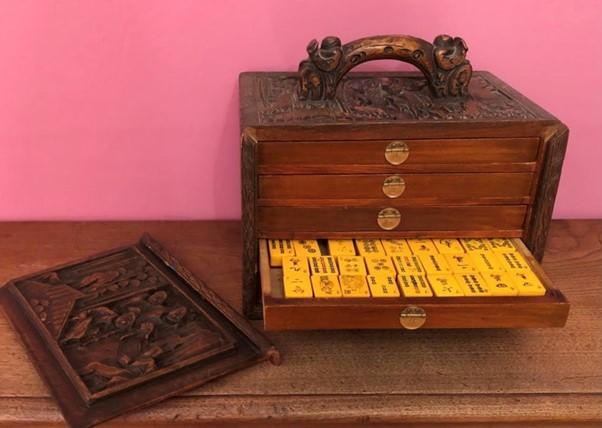Introducing Mandarin Aspirations Project Assistant Emily

Emily Austin-Howell, a third-year Liberal Arts student at the University of Leeds, has recently joined the Business Confucius Institute (BCI) team as the Mandarin Aspirations Project Assistant.
Her internship will progress the project's goal of sharing stories about Mandarin learners' experiences in order to educate, motivate, and inspire students.
In this article, Emily introduces her own Mandarin Aspirations story, tracing her motivations for learning Chinese, the philosophy that energised her learning journey, and how she plans to apply her knowledge and passion for Chinese language and culture in the future.
Why Chinese?
A language of opportunity
I chose Chinese (Mandarin) as my Year 7 language option in 2013. The same year, then prime minister David Cameron led Britain’s largest trade mission to China and lobbied for an EU-China free trade deal.
As a 13-year-old with a love for art, I was more motivated by the pictographic and calligraphic quality of the characters. I found intrinsic satisfaction in practicing characters and reciting new words and tones, while China's rising economic, political and cultural influence gave me confidence that these efforts may also have other benefits in the future.
An intellectual challenge
There is no getting around it, the initial jump from a European language to Mandarin is an experience that is challenging, but one that is stimulating and rewarding.
I felt like a new part of my brain had been unlocked, as well as an altogether new experience of language and communication.
While studying GCSE Mandarin, I competed in the HSBC British Council Mandarin Speaking Competition. Our four-person cast performed a comic play set at a Chinese restaurant to a packed auditorium. Despite not placing, I was thrilled to be included in the BBC's coverage of the event in an interview explaining the four Chinese tones.
"Mum and horse are the same word but have different tones," explained Emily, 15, "so you could get into quite a bit of trouble with that."
Childhood influences
When I look back to my childhood it can feel like my interest in China was meant to be.
Our family has a beautiful carved mahogany cased mahjong set. I would stack and jumble its tiles as a child before graduating to playing (with limited hands) as a family Christmas tradition.

My Great Aunt acquired our mahjong set at an antique shop in Hastings in the 1960s. She would play strip mahjong with her fellow students at university!
Last year, I found a photo album of my Great Aunt’s 2004 trip to China. Seeing her venture off the tourist trail, wending to a little-visited part of the Great Wall, slipping and sliding down the wall in the rain and emerging to dry off with noodles at a small hostelry, inspired that same spirit of adventure.
A determination to continue learning Chinese
I ran into a couple of dead ends during my learning journey. I learned a lot about perseverance and self-motivation as I looked for ways to continue my studies.
After transferring to a sixth form that did not have a Mandarin department, I dedicated Saturday mornings to working on my HSK 3 with an hour of one-on-one tuition.
After a brief hiatus from structured Mandarin learning during my gap year, I enthusiastically returned to my studies during my first year of university, enrolling in an Intermediate Mandarin module and making Chinese friends through the University of Leeds Language Exchange.
I had so much fun going back to classroom language learning that I enrolled in the Business Confucius Institute's Mandarin evening course.
After completing the highest BCI course level available, I transitioned to self-study.
I learn best and most consistently when I learn in ways that I enjoy and find enriching. I feel motivated after finding a good television program, film, documentary, or music. The Language Reactor browser extension comes in handy here. I also practice through browsing Youku, which is similar to YouTube, and Bilibili, which is like Facebook, aided by the Zhongzhong browser extension. This improves my comprehension through understanding authentic language in context. These sources are also motivating because immersion in the language and culture has made me feel more connected and culturally fluent.
Wu Wei - or going with the flow
A huge setback
As the Covid-19 pandemic disrupted our daily rhythms and plans, my study abroad placement at Fudan University in Shanghai for 2021/22 was cancelled. The long-awaited next step in my language learning journey, the manifestation of nearly seven years of hard work and dedication, was suddenly taken away.
This felt like a huge setback. My life philosophy had always been guided by specific goals and the steps I thought necessary to achieve them.
Discovering Daoism
Fortunately, over lockdown, I had set out to learn more about Daoism (one of the three principal religious denominations of China, alongside Confucianism and Buddhism).
Daoism represented a departure from my previously rigid and fixed philosophy. Rather, the Daoists believe that we should understand and act in accordance with the principles that govern nature - wild, unyielding, and stoic.
The practice of Wu Wei, for example, is to allow yourself to be led by the Dao (The Way) rather than resist it. A tree which stays rigid in the face of extreme wing force will eventually fall. We should be like the bamboo that bends in the wind. Through perseverance and consistency, we can bend around our challenges by acting with the currents of life rather than against them.
I have recently taken up Daoist Tai Chi, a moving meditative martial art that I find helps me into myself and the present moment. It represents a flow state in which I return to whatever I was doing with a new energy.
Applying Daoism to my Mandarin learning
Daoism - both in philosophy and practice - helps me to stay focused on enjoying my Mandarin progress in the here and now in order to maintain momentum in the long run. This has helped me to enter my third year of academic study with greater direction and focus – and I know that one day I will have my own adventures in China like my Great Aunt.
Looking to the future
I am delighted to have been appointed as the second Mandarin Aspirations Project Assistant, which I will undertake part-time alongside my studies.
I am motivated to apply my knowledge and passion for Chinese language and culture to share stories about the experiences of Mandarin learners. As the Mandarin Aspirations Project illustrates, learning Chinese has shaped the lives of many learners, which is something to which I can relate.
I aim to educate, motivate, and inspire students in the same way that the project did for me last year.
Two of my BCI programme highlights were Peter Peverelli's guest lecture on the seven dimensions of Chinese culture, which really opened my eyes to a new way of looking at diversity and an appreciation for a multiplicity of meaning, and Georgia Yexley’s talk and Mandarin Aspirations article about her impressive work in tech startup marketing in China, as well as action on diversity and sustainability.
I look forward to taking my first steps in the field of diplomacy. This work is meaningful to me because I am globally oriented and enjoy the challenge of an international and intercultural context, which involves a continuous exchange of knowledge and understanding.
Despite the world’s isolationist turn, I remain firmly committed to the importance of nurturing cross-cultural understanding and communication for the development of British-Chinese relations in the present and in the years to come. In our interconnected world of shared aspirations and serious common problems, these relationships will do much to define and enhance all our futures.
I hope you enjoyed reading about how and why I came to study Mandarin.
What was your journey?
Further reading
- Explore more Mandarin Aspirations stories
- Find out more about our Mandarin Chinese Evening Courses
- Try the key text of Daoism, The Dao De Jing
- Benjamin Hoff's The Tao of Pooh is written as an introduction to the belief system of Daoism from a Western perspective.
- Head to George Thompson’s YouTube channel for an approachable introduction to Daoism.
